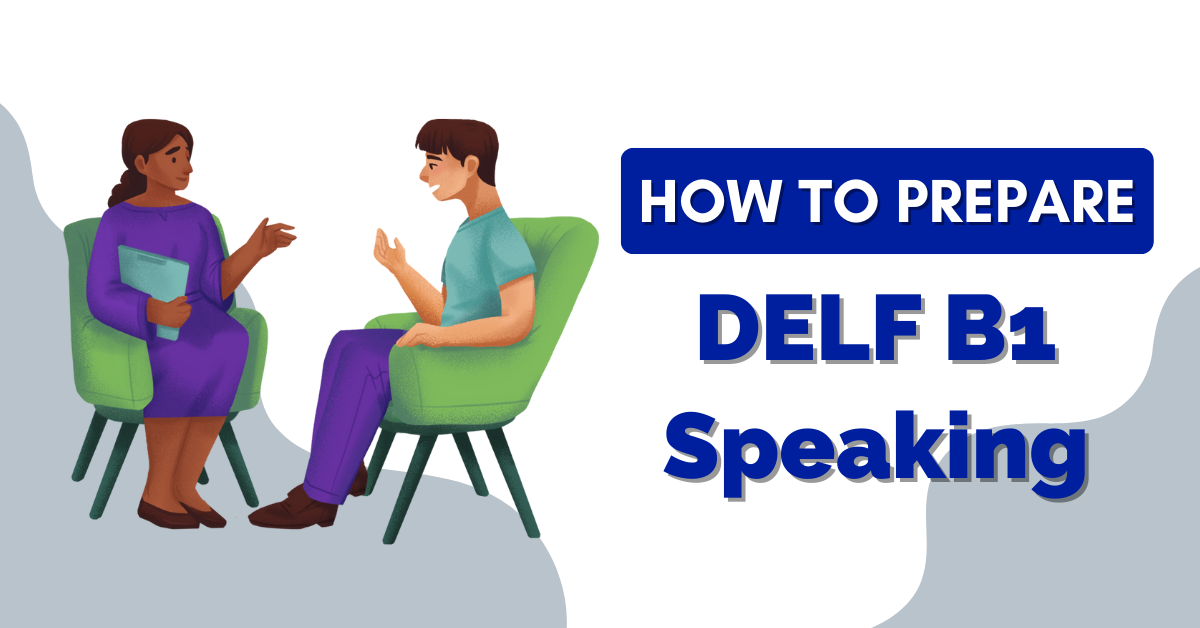Bonjour! If you’re preparing for the Diplôme d’Études en Langue Française (DELF) B1 exam, you’re on the right path to proficiency! The DELF B1 Speaking Test is a crucial component of the exam, allowing you to showcase your ability to communicate effectively in French.
Come with us as we show you how to speak French like a pro!
Format and Time Allotted for DELF B1 Speaking Test
This segment of the exam, known as “Production Orale” or Speaking, is designed to evaluate your ability to communicate effectively in French. Let’s explore the structure and timings you can expect during this test.
Part 1: Personal Interview (2-3 minutes)
During this segment, the examiner will engage you in a conversation to gain insight into your personality. You can anticipate questions about your interests, habits, hobbies, and significant aspects of your life. Be prepared to discuss your preferences, experiences, and anything else that sheds light on who you are.
This section aims to assess your ability to communicate about yourself in French.
Part 2: Roleplay/Dialogue (3-4 minutes)
In this part of the test, you’ll engage in a dialogue with the examiner based on a given scenario from daily life. The scenario might be formal or informal and could involve problem-solving, persuasion, or simple discussion.
Unlike the Personal Interview, there’s no prior preparation allowed for this task. You’ll need to think on your feet and communicate spontaneously, showcasing your ability to handle various conversational situations.
Part 3: Expressing a Point of View (5-7 minutes)
This final part involves delivering a monologue where you express your perspective on a specific topic.
You’ll have 10 minutes to prepare your thoughts before presenting your views to the examiner. After you’ve concluded your monologue, the examiner may pose 2-3 questions related to the topic for further discussion.
It’s essential to focus primarily on expressing your thoughts during the monologue, limiting the examiner’s input. This section aims to evaluate your ability to articulate your ideas coherently and convincingly in French.
Scoring Format in DELF B1 Speaking Test
Understanding the scoring criteria for the DELF B1 Speaking Test is crucial to your preparation strategy. In this, your performance is evaluated across four parts:
- First Part- Personal Interview: This initial section carries 3 points. The key is to express yourself clearly and fluently while showcasing your ability to engage in a dialogue.
- Second Part- Roleplay/Dialogue: Worth 5 points, this part involves simulating everyday situations or scenarios. Pay attention to both verbal and non-verbal cues to convey your message convincingly.
- Third Part – Monologue: Here, you have 5 points at stake. You’ll be given a topic and asked to speak about it for a few minutes. This is your chance to showcase your ability to sustain a coherent monologue, organize your ideas logically, and provide relevant examples or details.
- Fourth Part-This section is broken down into three sub-categories, each contributing to your overall score:
- Vocabulary: Worth 4 points, this assesses your range and accuracy of vocabulary usage.
- Morphosyntax: With 5 points allocated, this evaluates your understanding and application of grammatical structures.
- Phonetics: Worth 3 points, this focuses on your pronunciation and intonation.
Preparation for DELF B1 Speaking Test
- Practice Speaking Regularly: The more you speak French, the more confident you’ll become. Practice speaking every chance you get, whether it’s with a friend, a language exchange partner, or even talking to yourself in front of the mirror.
Don’t be shy; embrace every opportunity to flex those speaking muscles!
- Work on Your Vocabulary and Grammar: Brush up on your vocabulary and grammar skills. Make flashcards, use language learning apps, or join online language courses to expand your knowledge. The better your grasp of French vocabulary and grammar, the smoother your speaking will flow.
- Practice Structuring Your Ideas: Practice organizing your thoughts and ideas coherently. Work on structuring your sentences and expressing yourself clearly. Remember, it’s not just about what you say but how you say it.
Start with an introduction, use transition words, provide relevant examples, and conclude at the end. - Seek Feedback: Don’t be afraid to seek feedback from teachers, tutors, or native speakers. They can provide valuable insights and constructive criticism to help you fine-tune your speaking skills.
Materials for DELF B1 Speaking Test
- DELF B1 Réussir Book: This book is a gem when it comes to DELF B1 preparation. It’s specifically designed to cover all the topics and exercises you’ll encounter in the test.
From sample questions to helpful tips, this resource is tailored to guide you through every aspect of the speaking test.
- Cosmopolite 3 Textbook: When it comes to expanding your vocabulary and refining your pronunciation, Cosmopolite is your go-to companion.
This textbook offers a comprehensive approach to vocabulary building and phonetics, providing you with the tools to express yourself fluently and accurately.
- Online Resources: The internet is brimming with resources to support your DELF B1 Speaking Test preparation. Platforms like YouTube offer a plethora of videos ranging from grammar tutorials to sample speaking tests.
Podcasts in French can help improve your listening skills while providing exposure to authentic conversations. Additionally, seek out speaking test examples available online to practice your speaking fluency and coherence. - Flashcards and Vocabulary Lists: Strengthen your vocabulary by creating flashcards or compiling vocabulary lists. Focus on common topics and themes relevant to the DELF B1 Speaking Test, such as travel, leisure activities, daily routines, work environment and personal experiences.
Conclusion
Preparing for your DELF B1 Speaking Test may seem daunting, but with the right materials and dedication, you can ace it!
Consistent practice, whether through mock tests or conversations with language partners, is key. Stay focused, keep practicing, and believe in yourself.
You’ve got this! Good luck!





